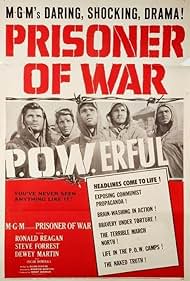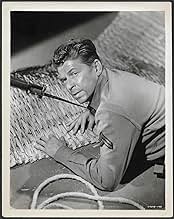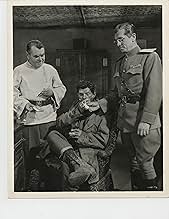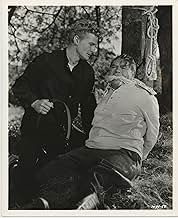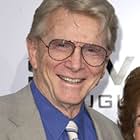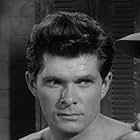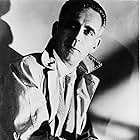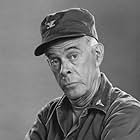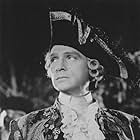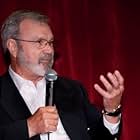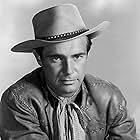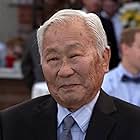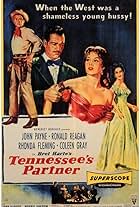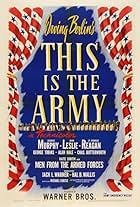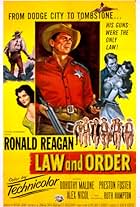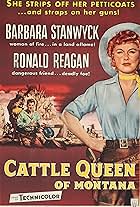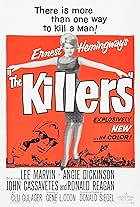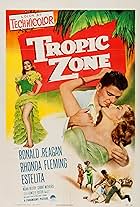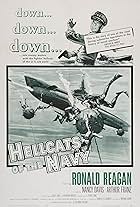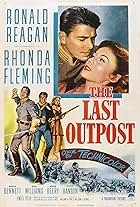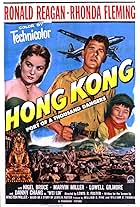Ajouter une intrigue dans votre langueDuring the Korean War, an American officer is tasked with infiltrating a Communist-run POW camp in order to investigate the treatment of American prisoners by the enemy.During the Korean War, an American officer is tasked with infiltrating a Communist-run POW camp in order to investigate the treatment of American prisoners by the enemy.During the Korean War, an American officer is tasked with infiltrating a Communist-run POW camp in order to investigate the treatment of American prisoners by the enemy.
Mike Berry
- Laverne Corlane
- (uncredited)
Avis en vedette
Ronald Reagan and a bunch of US soldiers in a North Korean POW camp. They are tortured... We learn North Korean Communists are bad people... We learn Americans' beards grow very slowly during days of torture...
I tried to suppress it, but I finally burst out laughing at this movie. It was the scene when Mr. Reagan comes out from telling the Communists he wants to be on their side. Then, he asks for a bottle of brandy. Next, acting stone-cold sober, he takes a drunken companion, Dewey Martin, to get sulfur to cure Mr. Martin's hangover. Of course, the North Korean communist guard is as dumb as they come. So, the drunk distracts the guard while Reagan goes over to get something from a drawer, which is next to a bunch of empty boxes. I'm sure he boxes were supposed to contain something; but, of course, Reagan causes them to shake enough to reveal they are empty. Ya gotta laugh! I think "Prisoner of War" will appeal mainly to family and friends of those who worked on it - otherwise, it's wasteful.
* Prisoner of War (1954) Andrew Marton ~ Ronald Reagan, Steve Forrest, Dewey Martin
I tried to suppress it, but I finally burst out laughing at this movie. It was the scene when Mr. Reagan comes out from telling the Communists he wants to be on their side. Then, he asks for a bottle of brandy. Next, acting stone-cold sober, he takes a drunken companion, Dewey Martin, to get sulfur to cure Mr. Martin's hangover. Of course, the North Korean communist guard is as dumb as they come. So, the drunk distracts the guard while Reagan goes over to get something from a drawer, which is next to a bunch of empty boxes. I'm sure he boxes were supposed to contain something; but, of course, Reagan causes them to shake enough to reveal they are empty. Ya gotta laugh! I think "Prisoner of War" will appeal mainly to family and friends of those who worked on it - otherwise, it's wasteful.
* Prisoner of War (1954) Andrew Marton ~ Ronald Reagan, Steve Forrest, Dewey Martin
It's hard to imagine much of a paying audience for this movie which was rushed into production early in 1954 to capitalize on news stories about ill-treatment of American POWs inside North Korea. Many of these stories dealt with the disturbingly high number of POWs who seem to have collaborated with the enemy in various ways and there was ominous talk that something called "brainwashing" might be responsible for this sorry state of affairs. MGM's problem was to work this material into a commercial property which would patriotically support "our boys" while, at the same time, acknowledge those troubling charges of collaboration. The movie tries to solve this dilemma by showing American POWs indeed confessing to "war crimes" but stressing the fact that this occurred only after they'd been subjected to prolonged, unrelenting torture of both a physical and psychological nature. To adequately make its case, the movie presents scenes of torture intended to be persuasive and yet acceptable to a general audience. These scenes probably remained in the viewers' memory long after the movie's more routine and predictable moments had been forgotten. Three scenes in particular stand out. (1) John Lupton, later of TV's "Broken Arrow" series, is shown kneeling with his arms pulled back and over a horizontal pole passing behind him. Heavy rocks are tied to his hands, painfully stressing his wrists, elbows, and shoulders. Each time the pole is lifted and then dropped, Lupton groans in torment. (2) Steve Forrest and a dozen or so other POWs are forced to lie face-up in open graves for several days and nights. They're exposed to the elements, given no food or water, and become increasingly filthy. Eventually they're taken from their graves and lined up before a firing squad for what proves to be a mock execution. (3) Steve Forrest, Robert Horton, later of TV's "Wagon Train," and six other POWs are crucified with ropes to wooden frameworks at the top of a hill and left to suffer long, slow agonies. All these tortures were attested to as being authentic but their impact is somewhat diminished by casting as their victims only young, handsome actors with virile physiques which are shown off by having the actors wearing nothing but dogtags, undershorts, and a gleaming coating of studio sweat. The result is a parade of homoerotic "beefcake in bondage" usually found only in sadomasochistic magazines! In other respects, the movie benefits from MGM's film-making professionalism and there are just enough crowd pleasing moments of dialog and characterization to take the edge off some of the movie's grimness.
(May 2010) Revisiting this movie after more than 10 years have passed, one can't help but be struck by its competency as a piece of film-making. We used to take this nuts-and-bolts stuff for granted but compare the big-studio professionalism of "Prisoner of War" with the sloppy work done, especially in the script department, with "The Hanoi Hilton" -- a 1987 film which tells a similar story about the Vietnam War. Both films are failures but at least "Prisoner of War" isn't an embarrassment.
(May 2010) Revisiting this movie after more than 10 years have passed, one can't help but be struck by its competency as a piece of film-making. We used to take this nuts-and-bolts stuff for granted but compare the big-studio professionalism of "Prisoner of War" with the sloppy work done, especially in the script department, with "The Hanoi Hilton" -- a 1987 film which tells a similar story about the Vietnam War. Both films are failures but at least "Prisoner of War" isn't an embarrassment.
Ronald Reagan stars in the anti-communist film "Prisoner of War", which is not a surprise as Reagan was one of the more vocal anti-communists in Hollywood during this Blacklist era. However, what is surprising is how dull his part is and clearly the supporting actor Steve Forrest has the meatier and more interesting part.
The story is set during the Korean War and a Captain (Reagan) is asked to do something strange by his commanding officer...to get himself captured by the North Koreans. This is because they want him to investigate the inhumane treatment of prisoners...and this seems like a rather strange and dubious request. Once in the prison, 'Corporal' Webb Sloane is a 'nice' prisoner...one who doesn't fight too hard to resist the indoctrination and brain washing of his communist captors. In contrast, Corporal Stanton (Forrest) is a true-blue patriot...fighting the dirty commies at every opportunity.
The film has some good and some bad. While the mistreatment of prisoners and strong attempts to brainwash them were well documented and could make for an interesting film, the movie itself comes off as rather obvious and not especially well written when it comes to dialog. It also didn't help that NONE of the North Koreans, Chinese nor Russians sounded the least bit like anything other than Americans! Overall, an interesting idea but one that is really just a time-passer instead of a strong statement against North Korean atrocities.
The story is set during the Korean War and a Captain (Reagan) is asked to do something strange by his commanding officer...to get himself captured by the North Koreans. This is because they want him to investigate the inhumane treatment of prisoners...and this seems like a rather strange and dubious request. Once in the prison, 'Corporal' Webb Sloane is a 'nice' prisoner...one who doesn't fight too hard to resist the indoctrination and brain washing of his communist captors. In contrast, Corporal Stanton (Forrest) is a true-blue patriot...fighting the dirty commies at every opportunity.
The film has some good and some bad. While the mistreatment of prisoners and strong attempts to brainwash them were well documented and could make for an interesting film, the movie itself comes off as rather obvious and not especially well written when it comes to dialog. It also didn't help that NONE of the North Koreans, Chinese nor Russians sounded the least bit like anything other than Americans! Overall, an interesting idea but one that is really just a time-passer instead of a strong statement against North Korean atrocities.
One reviewer found this movie quite hilarious. The film does have an unbelievable premise, that the military would actually send some one to investigate the POW camps. In fact in the opening scene, Harry Morgan (of MASH fame) tells Reagan that they have heard of atrocities but have no proof. but how did they hear? And why do they need proof? As if the Communists would actually be forced to behave humanely. That first scene was funny because Morgan comes off like he did as Gannon on Dragnet, the same stilted manner of speaking. Anyway, the film does portray the atrocities in a rather sobering way. And one neat thing is you get to see all these new actors in early roles: Strother Martin, Dewey Martin, Steve Forrest, Darrly Hickman, Dick Sargent and even Stewart Whitman. And One of the guards was Wesley Levy who played the communist leader on Satan Never Sleeps with William Holden. But it was a propaganda movie and so a bit forced and wooden except for Reagan. He was good.
Not a very good movie but according to the info it's pretty accurate in depicting torture techniques. The purpose of the film was to show the brutality of the NK POW camps and that's done effectively enough, with surprising frankness for the time. Whatever technical flaws exist (and there are plenty) by watching this you'll see a forgotten corner of a forgotten war and some pretty nasty stuff - again, nasty because it's being done north of the DMZ and not in Guantanamo Bay.
I don't think any of the Korean veterans brought up his torture when running for office, and if you watch the movies like this one and Pork Chop Hill in comparison to the Vietnam films. I don't know if it was the people in '54 being trapped in the WWII concepts (the boys tend to wisecrack a lot) or the war or what, but it's interesting to see this from the same system that 16 years later would be making movies like "Go Tell The Spartans".
I don't think any of the Korean veterans brought up his torture when running for office, and if you watch the movies like this one and Pork Chop Hill in comparison to the Vietnam films. I don't know if it was the people in '54 being trapped in the WWII concepts (the boys tend to wisecrack a lot) or the war or what, but it's interesting to see this from the same system that 16 years later would be making movies like "Go Tell The Spartans".
Le saviez-vous
- AnecdotesCapt. Robert H. Wise, who lost 90 pounds in a North Korean POW camp, served as the film's technical advisor and attested that all the torture scenes in the movie were based on actual incidents.
- Citations
Col. Kim Doo Yi: The Geneva Convention is merely a tool of decadent capitalism, comrade.
- ConnexionsReferenced in La brûlure (1986)
Meilleurs choix
Connectez-vous pour évaluer et surveiller les recommandations personnalisées
Détails
Box-office
- Budget
- 569 000 $ US (estimation)
- Durée1 heure 21 minutes
- Couleur
- Rapport de forme
- 1.75 : 1
Contribuer à cette page
Suggérer une modification ou ajouter du contenu manquant

Lacune principale
By what name was Prisoner of War (1954) officially released in India in English?
Répondre